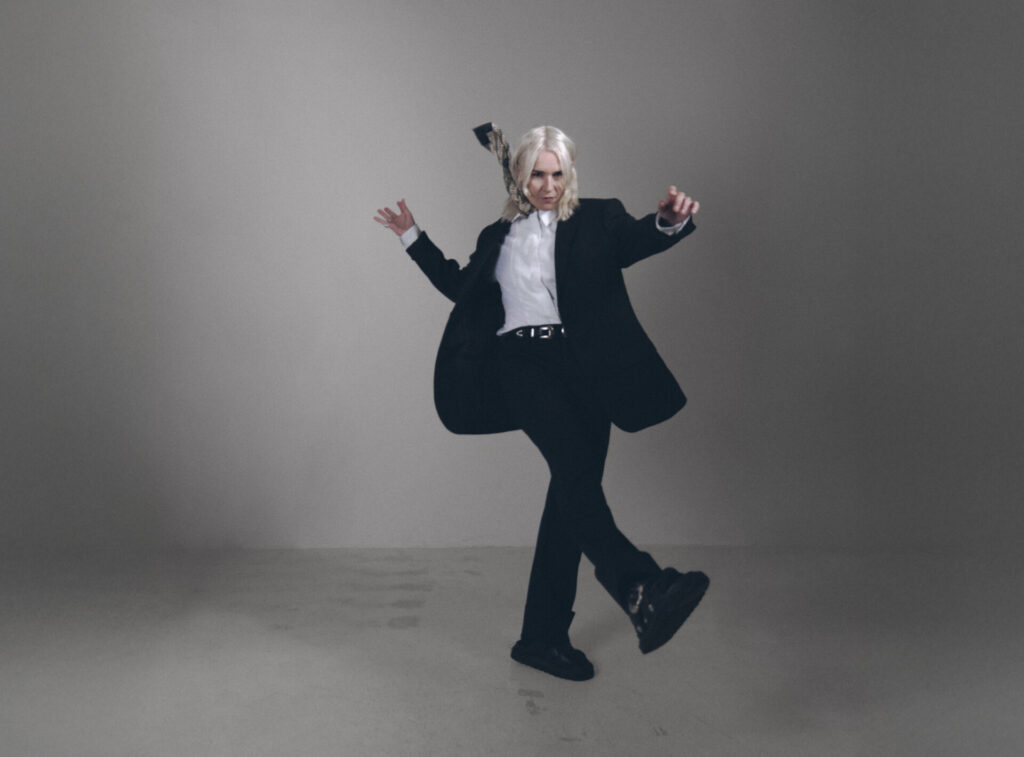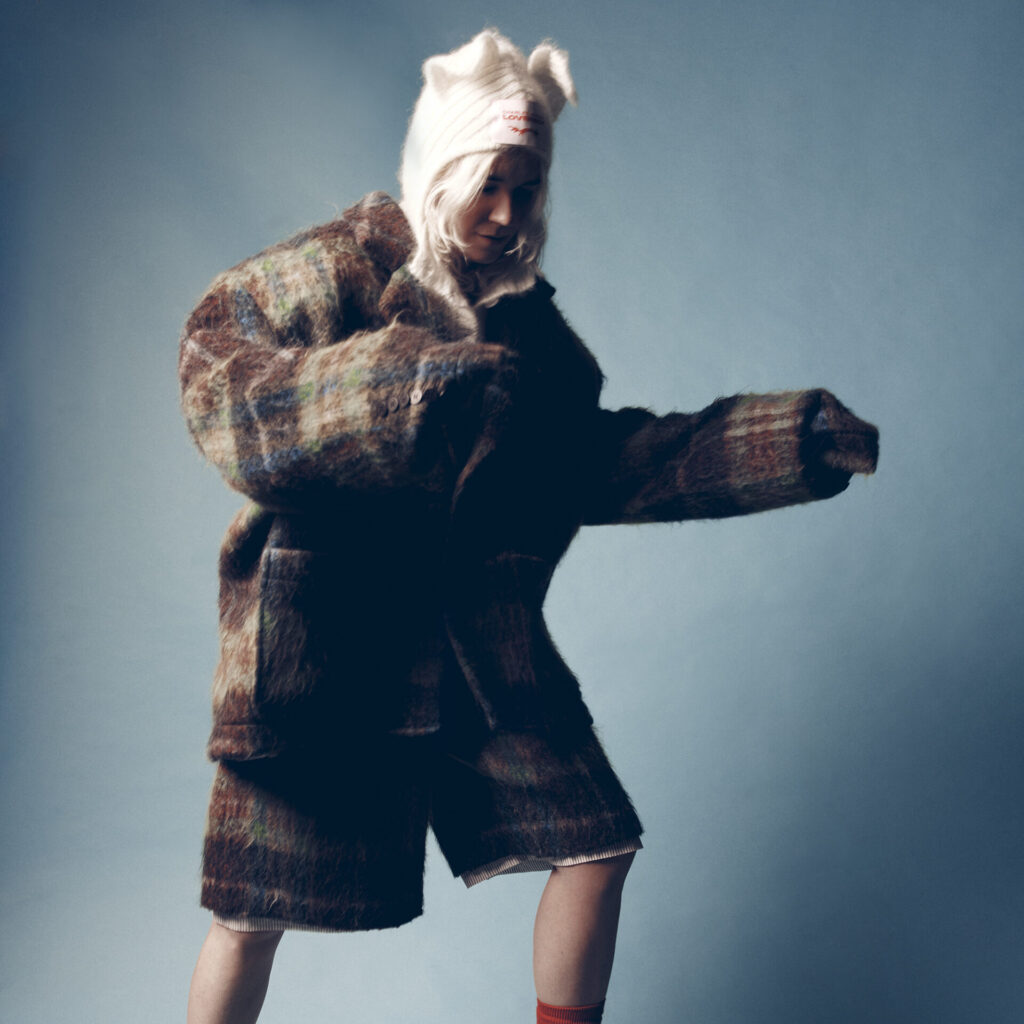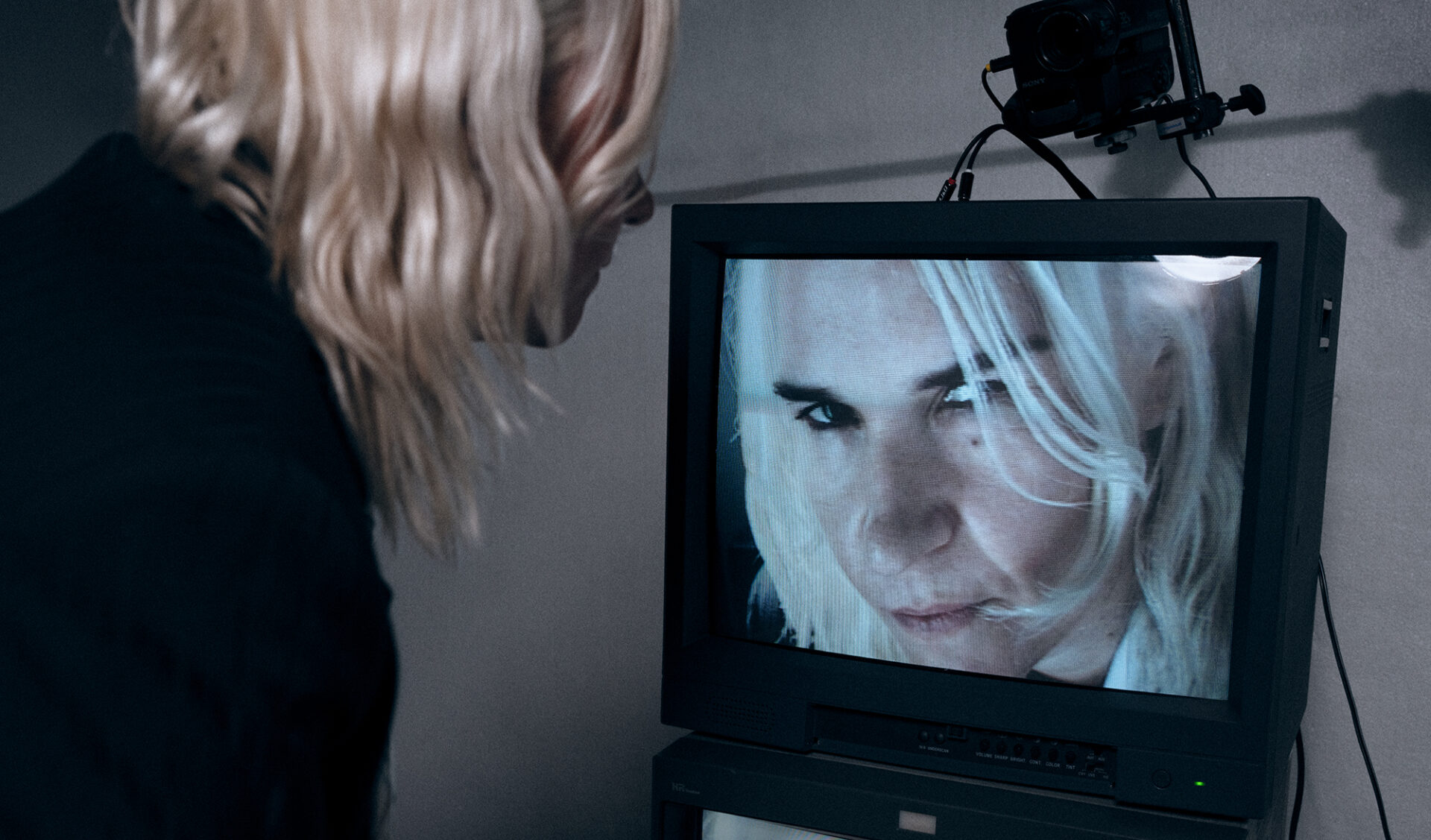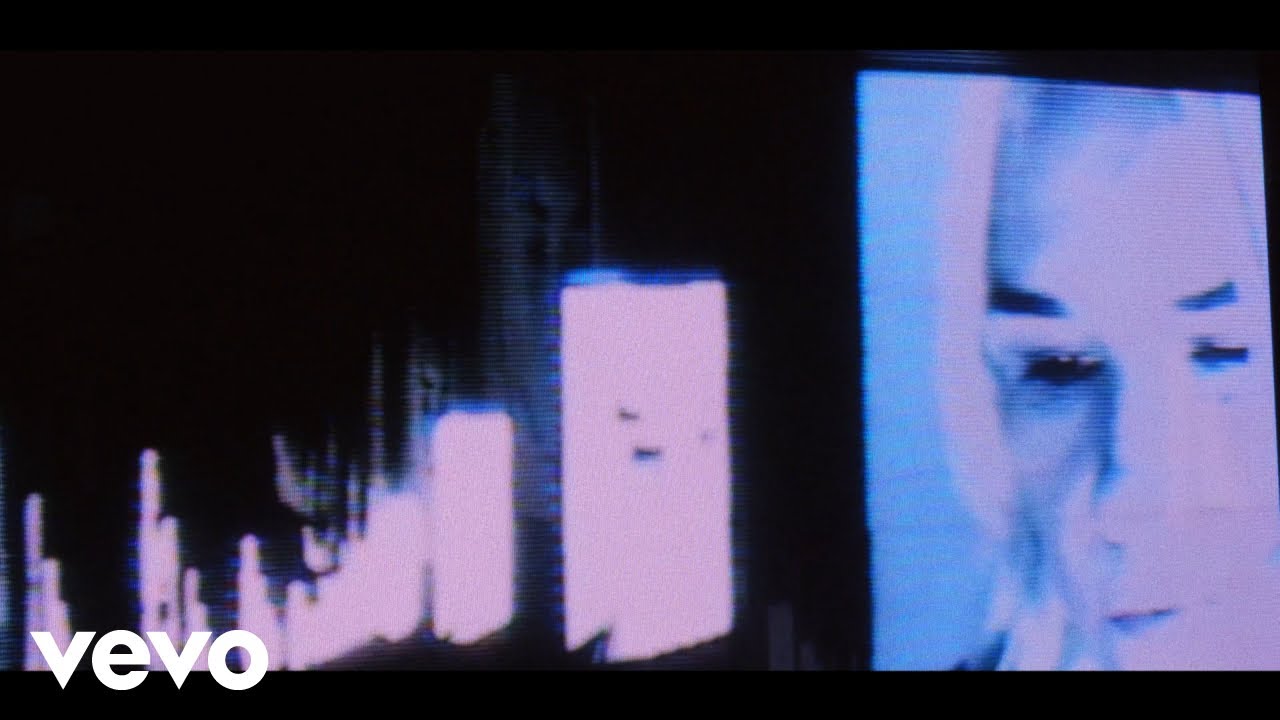As the music industry stares down the barrel of an AI-shaped gun, there are few better suited to find the human heart in the machine than Teneil Throssell, aka HAAi. An expansive producer with a songwriter’s unerring sense of timing, a DJ’s intuition, and a psychonaut’s willingness to plunge ever deeper, on new record Humanise HAAi is looking to the things that can’t be synthesised; the record is a celebration of found family, and the connections found in person on the dancefloor.
A DJ’s DJ, HAAI has clocked more than 100 sets across five continents in the last year alone. She’s become a fixture of London’s underground dance scene after years cutting her teeth that included a Saturday-night residency at Phonox, and building her own record label before signing with Mute in 2019. She’s amassed a devoted crowd of fans of her slippery, changeable techno, partly because she’s so adaptable, as at home at a five hour marathon basement set as she is chopping it up atop a UFO at Glastonbury.
Then there’s her work as a producer, whose dark techno turns and ecstatic peaks capture raving at its most euphoric. In 2022, she dropped a hypnotic, expansive debut album, Baby We’re Ascending, along with a blockbuster collaboration with Fred Again… and Romy, ‘Lights Out’. Since then, though, she’s largely been on the road and in the club, dropping a nearly three hour DJ-Kicks set and remixes for the likes of Kylie Minogue and Chloé Caillet. Now she’s ready for a new crop of fans to see her songwriter side.
“The bulk of my audience would know me from being a DJ,” says HAAi, who just wrapped up her largest North American tour to date. Although she rarely plays her own music in her sets, however, she doesn’t see her approach to DJing as separate from her mindset as a producer. “The way that the songs are structured and even the way the album is mapped out is not super far from how I DJ live in terms of chops and challenges – it’s just the musical approach is different.”

Humanise is one of several electronic albums this year to deal explicitly and tacitly with the ramifications of a world in which relationships – including the one between musician, listener, and dancefloor – are increasingly mediated by an algorithm. On City Of Clowns, Marie Davidson satirised the greed of technocapitalism in her signature French-Canadian deadpan, while Soulwax have used live drumming and tape loops to inject an organic swing into their upcoming record All Systems Are Lying. While largely avoiding any lyrics that directly allude to digital life, HAAi’s take on the issue offsets the weird wonderful glitchiness of her songs with one of the oldest building blocks in music: the human voice.
Initially the singer and guitarist for a psychedelic rock band from Sydney called Dark Bells, HAAi’s voice has been front and centre on some of her biggest songs, most prominently her first album Baby We’re Ascending’s title track, co-produced by Jon Hopkins, which delivers a triumphant kiss off singalong rarely found in the vortex of a 4 am dancefloor. The title of the new record comes from a vocal effect on a digital plug-in that HAAi and Hopkins toyed with one day in his studio. They laughed at the absurdity of the name of one of the dials: humanise.
“Don’t you think it’s just so mental that something that is so not human can give you the option of whether you want to sound more human?” says HAAi.
The concept of HUMANiSE was simple: re-centre vocals in her music and explore sounds away from the dancefloor. The result is a collection of tunes, somewhere between dance tracks and songs, incorporating a haze of reflections and tender confessions of care without the sacrifice of a techno thrum. Think: the morning after a rave, cuddling on your friend’s couch, braindead sipping coffee and Pedialyte, cracking up all the while. HAAi hasn’t lost her channel changer’s sensibility, and the songs are full of tricks and musical double entendres but more mid-tempo and wintery.
Nearly every track is toplined by her voice or one from her found family of collaborators (most of them appear on multiple tracks or on her previous full length record.) On ‘New Euphoria’, a 120 bpm slow build, Alexis Taylor of Hot Chip calls out with a mechanically fragmented voice that is answered by the celestial echoes of the Trans Voices choir. When writing the song, HAAi envisioned a wistful cyborg character, part-human part-android, embodied by Taylor’s voice. “I wanted it to be this yearning relationship between a person and something that wasn’t totally human – but a very sweet one.”
‘Shapeshift’ is a piano ballad, inverted and turned inside out by a hard turn into the fast lane, narrated by southwest London emcee KAM-BU. The human voice often forms the melodic backbone for songs before HAAi chops them up into stuttering, textured breakdowns. The glittering and keening lead single, ‘Can’t Stand To Lose’, is the album at its most conventional, though nonetheless compelling, while she pushes into spoken word territory with slam poet James Massiah on ‘All That Falls Apart / Comes Together’ and artist Kaiden Ford on ‘Go’ and ‘HQ’. Even the instrumentation carries the timbre of human voices – HAAi often incorporates field recordings from walking around Oxford Street or sitting at a cafe on the streets of Paris into her songs. “It needed a bit more humanity in there,” she says.
The visuals of Humanise accentuate the collective chorus of voices behind the music. In a 45-minute performance video filmed at Drumsheds, London’s IKEA-turned-megaclub, HAAi conducts her collaborators – including Obi Franky, ILA and the Trans Voices Choir, Jon Hopkins, KAM-BU, Kaiden Ford, and Alexis Taylor – from a set that’s modeled after the home office of her mother, who worked in data entry during her childhood. Amidst the chunky computers, modems and vintage synthesizers, this group of predominantly queer artists play dress up in a straight world of productivity, surveillance, and policed bodies.
In one interlude, queer artist Kaiden Ford, who was never accepted by their conservative parents, reflects, “I don’t think they’re proud of me, and I don’t seek that validation from them. But I’m happy that they taught me a very important lesson, which is that no one owes you anything.” In ‘Can’t Stand to Lose’, HAAi, who is also queer, clad in a big shirt, tie, and sock suspenders, croons, “You’re losing me/ And I feel, and I feel, and I feel like you’re never gonna get it.” The record creates the sense of an alcove of affection in an increasingly alienating world. One of the album’s strongest images comes from the cresting and plummeting ‘Voices’, which follows Londoners passing by in the dark outside a home’s warm window, its inhabitants fending off doubt and anxiety “as we try to celebrate.” For many queer people, nightlife is that very alcove.
According to HAAi, the presence of technology is also central to the performance. “The film itself is a reaction to how we digest music,” she says. “It leans into the idea of what Humanise is: trusting technology but knowing it can be volatile as well.” She points out the way that algorithms, everywhere from Spotify to TikTok, are shaping both the kinds of music that find an audience, where they can encounter them. It’s one of the reasons why she chose to write the album and has been experimenting with ways to bring more live performances with her onstage. As for machine learning and other technological factors shaping nightlife, she’s a realist. She wants to find ways to coexist that can protect the livelihoods of people who have found a career and a community in nightlife.

“One of the biggest parts of DJing is your connection with people. I’m looking, I’m seeing, and I’m taking my own experiences of what I’ve loved when I’ve been on a dancefloor, and showing that to people. You’re reading, whether it’s being received or not ,and making changes in what you’re doing based on that. I don’t see how you can bottle that,” says HAAi.
The record closes with a soft, thrumming love letter called ‘HQ’. It’s named after a flat where she and her friend group, affectionately dubbed ‘Smooches,’ would often congregate to get ready before a night out or for afters that lasted into the wee hours of morning. “It was the only place we called home,” intones Kaiden Ford over a gentle synth drone. For HAAi, this is the heart of the record, an experience of creativity and connection that can only be found in this way.
“You know when you have those good friends that you feel so safe with, and everyone loves each other so much and is pushing each other to do better things?” she says. “I really wanted other people to feel that too. It’s such a nice thing to be able to talk about in an album. As the final track, it was like sending people off with a warm hug.”
HAAi’s Humanise is released on 10 October via Mute



